Tag Archive: Challenging Behavior
October 7, 2018
by Carole Zangari -
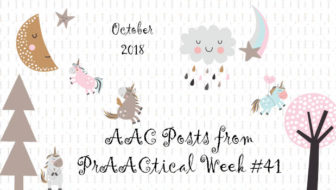
Happy Sunday, AAC friends! Here are some posts from the first week of AAC Awareness Month 2018. Take a look. Monday – Celebrating AAC Awareness Month 2018 Tuesday – AAC Link Up Wednesday – Video of the Week: The SLP’s Role in Cortical Visual Impairment Thursday – Building AAC Facilitation Skills with Tabi Jones-Wohleber: MASTER PAL Training, Module 7 Friday – PrAACtical Alert: Updated List of AAC App Discounts ::::::::::::::::::::::::::::::::::::::::::::::::::::::::::::::::::::::::::::::::::::::::::::::::::::::::::::::::::::::::::::::::::::::::::::::::: Can you squeeze in another AAC post or two? Here are a few suggestions. Using Structure to Minimize Behavioral Challenges Understanding Functional Communication Training PrAACtical Thoughts on Challenging Behavior and Emotional Regulation Parent-implemented Intervention for Challenging Behavior Ready/Not Ready: 5 Visual Supports for AAC Learners
Filed under: Featured Posts, PrAACtical Thinking
Tagged With: Challenging Behavior, summary post
April 18, 2018
by Carole Zangari -
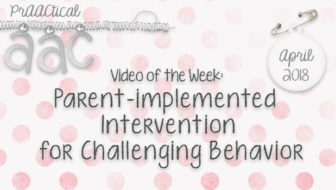
How can we better support people who have challenging behavior? When that behavior is related to communication needs, as it so often is, Functional Communication Training is often part of the answer. But how can we provide those kinds of supports in ways that are efficacious and feasible? And what about other sorts of behaviors that impact safety, learning, and quality of life? In today’s video, we learn about a parent training approach developed by the Research Units in Behavioral Intervention (RUBI) Autism Network. Many thanks to Dr. Bearss and the Els for Autism Foundation for making this archived webinar available. :::::::::::::::::::::::::::::::::::::::::::::::::::::::::::::::::::: Bearss, K., Johnson. C., Smith, T., Lecavalier, L., Swiezy, N., Aman, M., McAdam, D., Butter, E., Stillitano, C., Minshawi, N., Sukhodolsky, D., Mruzek, D., Turner, K., Neal, T., Hallett, V., Mulick, J., Green, B., Handen, B., Deng, Y., Dziura, J., & Scahill, L.(2015). Effect of parent training versus parent... [Read More...]
Filed under: Video of the Week
Tagged With: Challenging Behavior, FCT, problem behavior
November 1, 2017
by Carole Zangari -
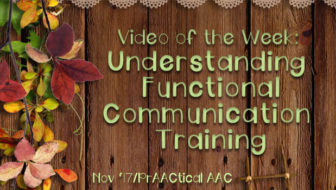
In most special education settings here in the US, professionals recognize the relationship between problem behavior and communication. For the most part, we’ve gotten better at acknowledging that when people hit, yell, flop to the ground, or throw materials, there’s a reason for their behavior. And many times, the behavior is a means of communicating. How do we determine what the communicative function is? How can we help the person communicate in safer, more effective ways? In today’s featured video, Laura Ferguson, of the Kentucky Autism Training Center at the University of Louisville, addresses these questions. Direct link to video: https://www.youtube.com/watch?v=-S7eIRvvoL0&list=PL2_i8EyveJe_UNsVzunszW3-Y3dEplws3
Filed under: Video of the Week
Tagged With: Challenging Behavior, FCT, problem behavior
February 8, 2016
by Carole Zangari -
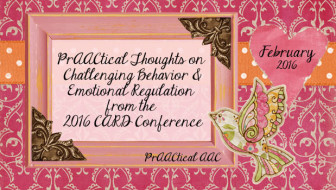
Last month, I had an opportunity to hear Dr. Barry Prizant, Director of Childhood Communication Services and Adjunct Professor at Brown University, at the 2016 Center for Autism and Related Disabilities Conference. Many of you know Dr. Prizant as co-author of SCERTS, the Social Communication Emotional Regulation Transactional Supports Program, and his recent book, Uniquely Human, discussed in this video. At this conference, he spoke on ‘An Emotional Regulation Approach to Preventing Problem Behavior.’ Here are some points of interest from his presentation. Dr. Prizant suggested that when someone is dysregulated, the first thing we should think about is biological factors that may be causing or exacerbating the problem. Why? Because unless we address the root of the problem, chances are slim that any behavioral, communicative, or psychological strategies will be effective in the long run. In some cases, there is a rather straightforward solution, such as teaching our client... [Read More...]
Filed under: PrAACtical Thinking
Tagged With: Challenging Behavior, emotional regulation
December 30, 2015
by Carole Zangari -
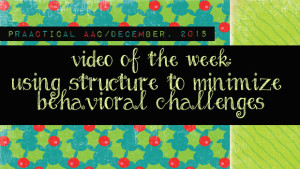
Good AAC therapy is marked by meaningful goals, well-planned instruction, and engaging activities. But for a session to be successful, interventionists also need to be able to manage any problem behaviors that threaten to derail the instruction. Many of the strategies we use to prevent or minimize these behaviors would also be helpful to parents and caregivers. In this week’s featured video, we turn to The Watson Institute in Pittsburgh. This short video is designed to help parents learn about strategies they can use to reduce problem behaviors at home, and can be a great one to share with some of our AAC families. Direct Link to Video: https://www.youtube.com/watch?v=t13ia4_ZImY
Filed under: Video of the Week
Tagged With: Challenging Behavior, problem behavior
May 27, 2015
by Carole Zangari -
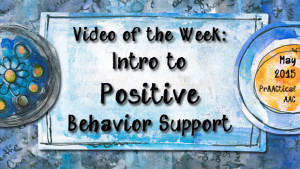
Most AAC practictioners understand and use elements of positive behavior support (PBS) in their work with people who have challenging behavior. This video, by the British Institute of Learning Disabilities (BILD), provides a helpful introduction to PBS, why it is used, and some of the key components. Even if you think you know PBS, this quick video is worth a watch. Not only is it a terrific resource to share with families and teams, but you may very well pick up a few things along the way.
Filed under: Video of the Week
Tagged With: BILD, British Institute of Learning Disabilities, Challenging Behavior, PBS, positive behavior support
May 13, 2015
by Carole Zangari -
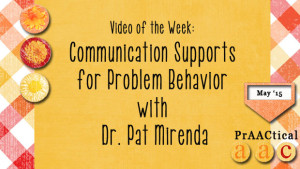
Last month, it was such a great honor to host Dr. Pat Mirenda at the UM-NSU Center for Autism and Related Disabilities (CARD). As some of you know, she was the presenter at our annual Issues in Autism Conference, and also was kind enough to record a shorter version of the presentation for the CARD eLearning site, CARD VINE. You can view that presentation below, and get the handout for it here.
Filed under: Video of the Week
Tagged With: ASD, Challenging Behavior, Dr. Pat Mirenda, problem behavior, UM-NSU CARD
December 28, 2014
by Carole Zangari -
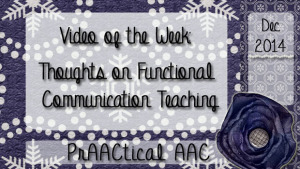
“Behavior is communication.” We’ve all heard it, but knowing what to do help a learner communicate effectively in less stressful, more socially appropriate ways is a complex issue that is best addressed through teamwork and collaboration. In this video, Rob Haupt shares some basic thoughts on Functional Communication Teaching from an ABA perspectivie.
Filed under: Video of the Week
Tagged With: Challenging Behavior, FCT, Rob Haupt
December 9, 2014
by Carole Zangari -
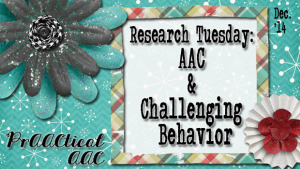
Research reviews are helpful tools for SLPs looking to implement evidence-based practices in their clinical work. In this month’s Research Tuesday post, we look at the work of Drs. Virginia Walker and Martha Snell, who conducted a meta-analysis to look at the relationship between challenging behaviors and AAC interventions. They looked at 54 different research studies with a total of 111 children and adults with AAC needs. They conducted both analytical and descriptive analyses. The research studies included participants at the emerging, prelinguistic, and multi-word levels of communication. Challenging behaviors were codes as distracting, disruptive, and/or destructive. Effect sizes were calculated using the Non-overlap of All Pairs method. Among their findings: AAC interventions reduce challenging behavior across a wide range of participants, including children and adults with a variety of developmental disabilities. AAC interventions were more effective with children (12 and under) than they were with adults (18 years and... [Read More...]
Filed under: PrAACtical Thinking
Tagged With: Challenging Behavior, FBA, FCT, Martha Snell, Research Tuesday, Virginia Walker
March 19, 2014
by Carole Zangari -
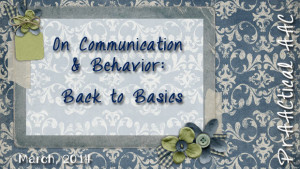
The other day we heard from an SLP who was supporting a child with significant communication difficulties. She contacted us because the team had hit a snag in their communication supports for this student. The student was successfully able to communicate with PECS but rarely did so. Instead, she used her body and challenging behavior to express herself most of the time. “Why does she hit when she can use her PECS book to tell us what she wants?” We’re not any more clairvoyant than you are, but we certainly had some ideas about this. Functional Communication Teaching can be very effective in helping people reduce their use of challenging behaviors in favor of more socially accepted means of communication. BUT, there are some of the basic principles that are have to be attended to when designing and implementing a set of behaviors that will replace the challenging behavior. This... [Read More...]
Filed under: PrAACtical Thinking
Tagged With: Challenging Behavior, FCT, functional communication teaching, Pat Mirenda









